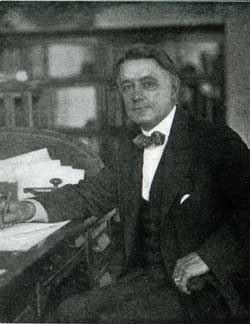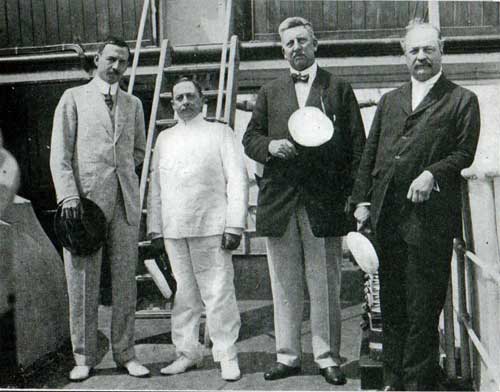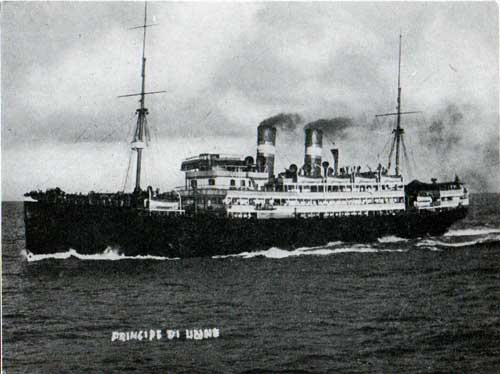The Sailing of a Refugee Ship - The Sailing of the Ship
As soon as it was evident on August first that a general European war was certain, and means of transportation, as well as all sources of financial supply were cut off, the greatest agitation and distress prevailed among the tens of thousands of Americans scattered all over Europe. They naturally turned to the nearest embassy or consulate for advice and assistance.
In view of the declared neutrality of Italy and the likelihood that that neutrality would be preserved and respected, large numbers of Americans concentrated in Milan and Genoa in the hope of being able to obtain passage to America on vessels sailing under the Italian (neutral) flag. By evening on August first, every available berth in the Italian ships scheduled to sail between that date and October first, was definitely engaged, and hundreds of names were upon the waiting lists.
The Lloyd Sabaudo Company, which maintains a considerable fleet for the South American trade, and which also announces regular sailings to New York, had scheduled the steamer Re d'Italia to sail from Genoa on Tuesday, August eleventh. A few Americans, including Dr. Nicholas Murray Butler and his family, Mr. and Mrs. George B. McClellan, and Mr. and Mrs. G. C. Speranza of New York, were successful in procuring accommodations upon that ship.
On Tuesday, August fourth, it was rumored that the Re d'Italia would not be able to sail, since the Italian Government had need of it for public uses. On the following day, definite announcement was made at Milan that the Re d'Italia would not be able to sail; and that the passengers having booked by it would have their payments refunded. It was then clear that it was by no means certain that any other ship would be able to sail from an Italian port, and the whole situation was involved in new gloom and uncertainty.
On the evening of Tuesday, August fourth, Mr. R. A. C. Smith, Dock Commissioner of New York, arrived in Genoa from Venice, and early the following morning began negotiations to secure passage to New York for as many of his fellow Americans as possible.
In conference with Consul General Jones, he devised a plan by which the steamer Principe di Udine, belonging to the South American service of the Lloyd Sabaudo Line, should be chartered through the agency of the Consul General in the name of the United States Government, all costs and charges to be guaranteed by Mr. Smith and his friends.
The object of this plan was to remove so far as possible the uncertainty which prevailed as to the possibility of any early sailing from Genoa to New York, and to put the control of the whole matter into the hands of Mr. Smith and his fellow Americans.
During August fifth and sixth, there was a concentration in Genoa of a large number of well known Americans who had been traveling in northern Italy when the war storm broke. In addition to Mr. Smith and his family, there were Dr. Butler of Columbia University, Mr. Gano Dunn, President of the J. G White Engineering Corporation Mr. Frederick W. Vanderbilt, Medical Director J. C. Boyd, U. S. N., retired, and many others.

CONSUL GENERAL JOHN EDWARD JONES, OF GENOA
All these gentlemen were in constant conference with Consul General Jones and with the hundreds of their fellow countrymen who were besieging the American Consulate for advice and assistance both by day and night. The plan to charter the Principe di Udine was submitted to Ambassador Thomas Nelson Page, at Rome, and approved by him. It is, therefore, due to the courage, sagacity and patriotism of Consul General Jones and the prompt and effective support of Ambassador Page that the sailing of the Principe di Udine was thus made possible.
Therefore, a contract with the Lloyd Sabaudo Company was entered into by which this ship was chartered for the voyage to New York, the sailing to take place on August twelfth, without fail, at a charter price for the first and second cabin accommodations, of 300,000 francs.
When the negotiations were at this stage, it was the intention of the steamship company to call at Naples, and also at Palermo, in order to embark some 1100 Italian emigrants in the steerage of the vessel. Farther study of the situation made it plain that the carrying of emigrants would be undesirable because of the four days delay their embarkation would occasion, and because of the possible embarrassment their presence on the vessel might afford to the Americans.
Therefore, the committee of guarantors, consisting of Messrs. Smith, Butler, Vanderbilt, and Dunn, asked the Lloyd Sabaudo Line to fix an additional charter price, in return for which the ship would sail directly from Genoa, without calling at Naples and Palermo, and without any emigrants in the steerage. An agreement was reached by which the additional sum of 200,000 francs was paid for this amendment to the original contract. The charter price, therefore, was 500,000 francs, gold.
No sooner was this contract signed, than new difficulties arose, and it was not until the gang-plank was actually hauled in and the ship began to move at noon on Wednesday, August twelfth, that those in charge of the undertaking could breathe freely.
By the terms of the charter, 50,000 francs had to be paid in cash to the Lloyd Sabaudo Company before 4.30 P. M. on Friday, August seventh, and the balance, 450,000 franc% on the day before sailing, Tuesday August eleventh. To meet these conditions required no small ingenuity, as well as constant and difficult negotiations. A moratorium had been declared in Italy, and the banks were only paying their depositors limited and small amounts daily. It was next to impossible to obtain cash on letters of credit issued in America, and, with the exception of the checks issued by the American Express Company, practically no travelers' checks were available.
One or two of the larger banks both in Milan and in Genoa made small daily payments on account on letters of credit, but it was not possible in this or in any other way to accumulate sufficient cash to make the payments required by the charter. At this point, the general manager of the American Express Company in Genoa, Mr. Sarentino, came to the aid of the Americans with splendid resourcefulness and generosity.
By taking the personal checks and personal guarantees of the guarantors, he was able at 4.25 P. M. on Friday, August seventh, or five minutes before the option expired, to make the payment of 50,000 francs to the Lloyd Sabaudo Company.
Meanwhile, it had been discovered that the National City Bank of New York had a considerable cash deposit in the banks of Genoa. The guarantors, therefore, attempted to open negotiations by cable with their own banks in New York, asking these to transfer to Genoa through the City Bank sums sufficient to enable them to make the final payment of 450,000 francs, gold on Tuesday, August eleventh.
Owing to the war conditions which prevailed, these cables were greatly delayed in transmission, but a final and most urgent personal cable sent by Dock Commissioner Smith to President Vanderlip of the National City Bank on Sunday, August ninth, reached him and brought instant response. He stated that the necessary funds had been transferred to Genoa through London.
It was now within forty-eight hours of the time fixed for the sailing of the ship, and the Banca Commerciale in Genoa would not accept Mr. Vanderlip's cable as evidence that the money had been transferred, without additional confirmation from London. This confirmation could not be obtained owing to the long delays and uncertainties in telegram communication, to say nothing of the rigid censorship prevailing in each one of the belligerent countries. Here again the general agent of the American Express Company came to the rescue.
By his co-operation and through his acceptance of the personal checks and guarantees of the committee of guarantors, it was possible to make the final payment to the Lloyd Sabaudo Company in time to carry out the terms of the charter and thus permit the ship to sail. From the whole company of 400 passengers, it proved possible to collect only about 60,000 francs in actual cash.
The balance was taken by the guarantors and by the American Express Company in the form of drafts attached to letters of credit, in receipts for prepaid return steamship passages, in travelers' checks of various kinds, and in personal checks on well known banks and trust companies in the United States. Inasmuch as gold was at a premium of fifteen per cent, according to official advice of the American Express Company, and since there were various bankers' commissions and other charges, the payment of 500,000 francs, gold for the ship required a payment, in lire, of about 575,000 francs, or approximately 115,000 dollars.
J It is difficult to make clear to those who were not in Genoa or in Europe during these days of uncertainty and anxious distress, what formidable difficulties of every kind —technical as well as financial—had to be surmounted, and what an amount of patience, ingenuity and resourcefulness were needed to overcome them. All these financial negotiations were carried on in behalf of the committee of guarantors by Messrs. Smith, Butler, and Dunn; Dock Commissioner Smith acting as chairman of the committee and taking the leading part in all the negotiations.
Meanwhile, a system had been organized by which places on the ship were assigned to as many as possible of those who were in waiting and had registered their names in the office of Consul General Jones. Within an hour, an administrative system was devised, which was a model of effectiveness and promptness.
Three vacant rooms were hired in the same building with the office of the Consul General, and some old tables and planks were quickly arranged as office furniture. Anxious inquirers were received by Mr. Henry Saunders Haskell, of New York City, who gave accurate information regarding the ship, the rates to be charged for passage, the date and place of sailing, and other matters of detail.

MR. DUNN, Captain Tiscornia, MR. SMITH, and DR. BUTLER,
on board the Principe di Udine
The assignment of rooms and berths was made at the next desk by Messrs. Smith and Butler. Intending passengers then recorded with Mr. Louis Dwight Ray, Headmaster of the Irving School, New York, their full names and addresses both in Genoa and in the United States. At the right of Mr. Ray sat Mr. James A. Lewis, of New York, who made up the official list of passengers for the ship's manifest.
Intending passengers then passed into the next room where they were received by Mr. Gano Dunn, who served as treasurer and accepted in cash or in evidences of credit their payments on account for their passage. In this work Mr. Dunn was assisted by Mr. George R. Stearns, a leading cotton manufacturer of Augusta, Georgia, and by Dr. W. 0. Bartlett of Boston.
When these details had been settled, the agents of the Lloyd Sabaudo Company, who were seated at an adjoining desk, issued the passage tickets. These arrangements were continued throughout Monday and Tuesday, August tenth and eleventh, and the men worked far into the nights of both days, completing their records and checking their lists. The whole work was done with promptness, accuracy, and efficiency.
Inasmuch as no Italian emigrants were taken on the ship, the vessel was managed as if it were a single class boat, and all passengers, wherever berthed, and paying whatever rate, had the full privileges of the decks and public rooms.
The price of passage to New York was fixed at 250 dollars, gold, minimum price, per berth for accommodations in the rooms scheduled as first cabin; 100 dollars, gold, per berth for accommodations in the rooms scheduled as second cabin; and 50 dollars, gold, per accommodation in the "dormitories" as the steerage was called after it had been thoroughly renovated. These "dormitories" provided places for fifty women at one end of the ship, and for eighty men at the other.
Every berth was speedily allotted, and very many anxious Americans had to be left behind. The ship was crowded to the utmost capacity of its sleeping and table accommodations. It was necessary to provide in both salons for two services at luncheon and two at dinner, and the ship's stewards were engaged from morning till night in caring for the needs of the passengers.

The Principe di Udine Steamship of the Lloyd Sabaudo Line
None but Americans were permitted on the ship, with the exception, of course, of the ship's own personnel. Provision was finally made for 399 in all. Of these, 193 were berthed in what was described as first cabin, and 206 in what were described as second cabin and the dormitories. Of these, 166 were men and 233, women. A number who were absolutely destitute of funds were taken without payment of any passage money whatever.
It was necessary, in order to provide for so many, to separate families in many cases, and to berth three to six women or men together in a single room. All this was most cheerfully accepted by the passengers as a necessity of the situation, and the utmost good feeling prevailed.
In order to provide for the health of the passengers, a special volunteer medical service was organized—in addition, of course, to the excellent provision made by the ship's surgeon himself—under the direction of Dr. John C. Boyd, U. S. N., with whom were associated Dr. A. C. Stanley, of Washington, Dr. W. 0. Bartlett, of Boston, and Dr. Stewart Paton, of Princeton, New Jersey. Dr. Boyd and his associates saw that the ship was specially provided with a full outfit of medical and surgical supplies, and they did yeoman's service in caring for the ills of the passengers.
Mrs. Evelyn R. Simpson, a graduate of the Mt. Sinai Hospital Training School, offered her services as ship's nurse, and she gave those passengers who were ill the most skilful and tender care during the entire voyage.
For the entertainment of the ship's company, a committee was appointed consisting of Mr. Landon Thomas, of Augusta, Georgia, Mrs. William H. Hill, of Boston, and Mr. Joseph B. Thomas, of New York.
The committee of guarantors, consisting of Messrs. Smith, Vanderbilt, Butler, and Dunn, not only guaranteed to the American Express Company in Genoa the letters of credit, travelers' checks, and personal checks of those of their fellow passengers who were unknown to the American Express Company, but they also assumed the obligation to meet the deficiency which resulted from the difference between the passage money paid by the 399 passengers and the chartered price of the ship. In round numbers this deficiency amounted to 40,000 dollars.
EDITOR'S NOTE: In the "Unofficial Log" is reprinted a copy of the resolutions passed by the passengers of the ship, in which they expressed their appreciation of the generosity and untiring efforts of the Committee of Guarantors. Besides adopting these resolutions, the "refugees" arranged for the purchase of a handsome testimonial to be presented as a token of their gratitude to Mr. R. A. C. Smith, for his devoted and loyal service in the capacity of Chairman of the Committee.
